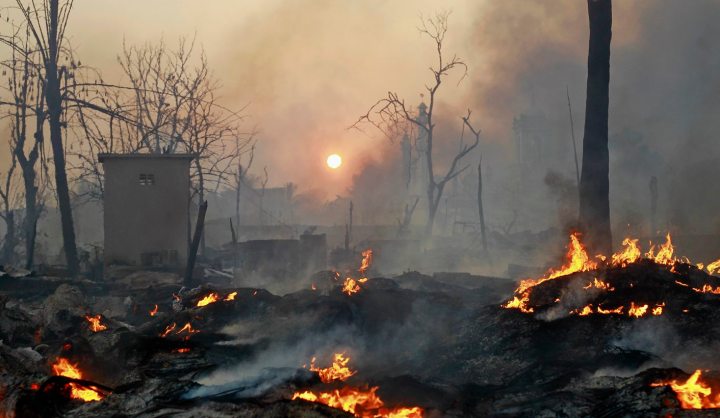Newsdeck
Myanmar authorities accused of aiding killings of Muslims

Human Rights Watch on Monday accused authorities in Myanmar's western Rakhine State of crimes against humanity in the ethnic cleansing of Rohingya Muslims last year, charges the government dismissed as one-sided and "unacceptable". By Paul Carsten.
Security forces were complicit in disarming Rohingya Muslims of makeshift weapons and standing by, or even joining in, as Rakhine Buddhist mobs killed men, women and children in June and October 2012, New York-based HRW said.
The human rights abuses took place in Myanmar despite widespread political, social and economic reforms by a quasi-civilian government that took power in March 2011 and convinced the West to suspend most sanctions to allow aid and investment into one of Asia’s poorest countries.
“While the state security forces in some instances intervened to prevent violence and protect fleeing Muslims, more frequently they stood aside during attacks or directly supported the assailants, committing killings and other abuses,” the report said of the unrest, in which at least 110 people died.
The failure to investigate properly or punish state officials had emboldened those behind campaigns against Muslims elsewhere, said Phil Robertson, deputy Asia director at HRW, referring to violence in central Myanmar that killed more than 43 people in March and displaced at least 12,000.
“People are allowed to incite and instigate in a coordinated campaign – this is the lesson taken in by others,” Robertson told Reuters. “What happened in Arakan (Rakhine) has helped spark radical anti-Muslim activity.”
Ye Htut, a presidential spokesman and Myanmar’s deputy Minister of Information, dismissed the report for only taking news from “one side” in a statement on his Facebook page.
“Its words are unacceptable. The government of Myanmar is not going to give any special consideration to a one-sided report,” he wrote, adding that the government would only pay heed to its own investigative commission set up after the initial violence in June.
LOSING LEVERAGE
U.S. State Department deputy spokesman Patrick Ventrell said the United States was reviewing the allegations in the HRW report and would “continue to engage vigorously” with the government on the Rakhine conflict.
“We remain concerned about instances of mob violence and violence directed against religious and ethnic minorities in Burma,” he told reporters in Washington.
Washington urges Myanmar to “take appropriate steps to prevent further outbreaks of violence, provide protection and support to victims of violence, and facilitate regular, unhindered and timely humanitarian access to all internally displaced persons and others in need,” added Ventrell.
A decision expected on Monday by the European Union to lift all but its arms embargoes would only weaken the hand of Western powers seeking to clean up Myanmar’s poor human rights record, Robertson said.
“They’re going to be hostage to what the military and government does,” he said. “They’re not going to have the kind of leverage and capacity to push back on the government if it becomes more oppressive.”
The report into the Rakhine state violence, which called for international pressure on the government, said authorities had blocked aid from going into the squalid camps occupied by stateless Rohingya and Kaman Muslims, exposing them to malnourishment and diseases such as cholera or typhoid.
Robertson described the segregation of Muslims as “ghettoisation” that left them vulnerable to abuse.
More than 120,000 people fled arson and machete attacks in Rakhine state and thousands have embarked on perilous journeys on rickety wooden boats to other countries, where they are prey to human trafficking gangs.
An estimated 800,000 stateless Rohingyas live in Myanmar, where the authorities restrict their movements and access to employment and consider them illegal immigrants from Bangladesh.
The HRW report said more than 70 Rohingyas were killed in Mrauk-U Township’s Yan Thei village in October, among them 28 children and infants who were hacked to death. DM
Photo: Buildings around a mosque burn in Meikhtila March 21, 2013. Ethnic hatred has been unleashed in Myanmar since 49 years of military rule ended in March 2011. And it is spreading, threatening the country’s historic democratic transition. Signs have emerged of ethnic cleansing, and of impunity for those inciting it. REUTERS/Soe Zeya Tun


















 Become an Insider
Become an Insider